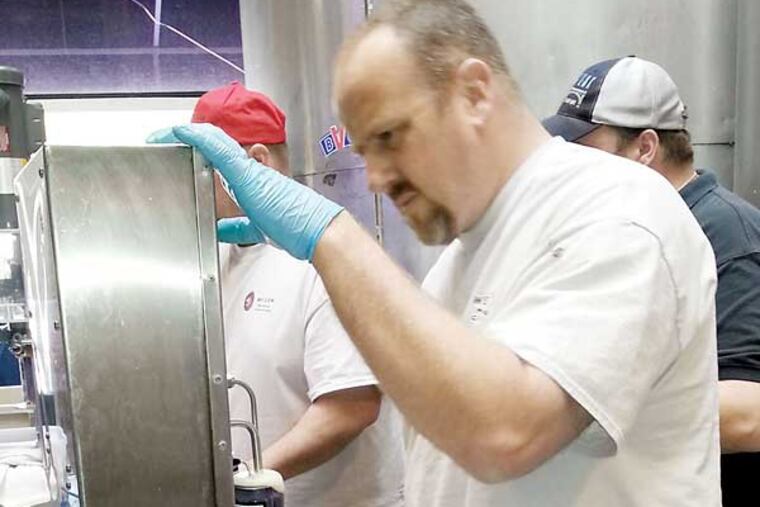A movable beer-canning operation makes its local debut
You know a microbrewery has stepped it up a notch when it graduates from kegs to bottles and cans.

YOU KNOW a microbrewery has stepped it up a notch when it graduates from kegs to bottles and cans - and not just because the beer can be shipped to more drinkers in new destinations.
It's one thing to fill up a half-barrel with 15.5 gallons of brew. It's a whole 'nother thing to spray exactly 12 ounces of those gushing suds into an assembly line of fragile glass and dentable aluminum containers.
It takes a lot of cash, plenty of floor space, technical experience and unending patience to handle the touchy, highly calibrated packaging equipment. Which is why most new brewers don't even think about stepping up to bottles and cans for two or three years.
That wait could get a lot shorter, thanks to a new contraption that showed up in Philadelphia this week.
Introducing the mobile, self-contained canning line.
They've been popping up in the Northwest and elsewhere over the past months, and the first one on the East Coast made its city debut Monday in a tight space among the tanks at Manayunk Brewing.
It spit out about 100 cases of fresh Dreamin' IPA, to be distributed shortly through the region.
That doesn't sound like much, but consider that, until recently, almost 100 percent of Manayunk's production was consumed only from barstools at its Main Street location. (A short-lived experiment with hand-bottling never took off.)
Like many brewpubs, Manayunk has sought to expand its distribution to Philly's many craft-beer bars. It does send kegs to area taverns, and it's even made custom beers for some restaurants, including some excellent Belgian styles for the Iron Abbey, in Horsham.
But, with its brewhouse tucked along the banks of the Schuylkill, space is at a premium at Manayunk. "We just don't have room for a dedicated canning line," said brewer Doug Marchakitus.
The mobile canning line from We Can Mobile Canning, in Danville, Pa., solves that problem.
Set up on a short row of stainless-steel tables, it doesn't look like much: an electronic filler connected with hoses to Manayunk's tanks, a spinning lid-capper, and space to rinse and assemble the finished product into six-packs.
The work is done by hand; at top speed, We Can's four-man crew can put out six cans a minute, or 10 barrels a day.
Again, that doesn't sound like much - especially compared with blinding-fast automated lines that fill 400 cans a minute.
But owner Pete Rickert Jr. notes it's not all about speed. "This is more about convenience," said Rickert, 38, who founded the company with his father. "With us, the breweries don't have to buy 70,000 cans and store them on-site."
Better yet, by using nifty, shrink-wrapped labels instead of preprinted cans that must be ordered by the truckload, We Can can offer extremely short runs of specific brands. Even the tiniest backyard brewery can put its beer in cans.
Indeed, We Can actually made its area debut earlier this month at Keystone Homebrew Supply, in Montgomeryville, where homebrewers were able to can as little as 5 gallons each.
"Almost any beer can go into a can, except for maybe sour ale," said Rickert. "They can get a little wild on you. . . . And there was one guy at the home-brew event with a stout that was made with Starbucks coffee. There was a lot of stuff in that beer, and we just couldn't get it up to pressure."
We Can has already produced cans for Lavery Brewing, in Erie. Rickert said he has 18 more breweries lined up, and he's planning to add a second, manual system that will triple his output.
When I watched it in action Monday, the assembly line was balky at times, as Rickert adjusted beer-soaked controls. But slowly the pallet of cases grew.
We Can stayed in town three days, canning the IPA and two other brands: Monk from the Yunk Belgian-style triple and raspberry-flavored Schuylkill Punch.
"I started with the assumption that I was a brewpub brewer," Marchakitus said, as we watched the progress. "But now we're a brewpub being a production brewery. These guys make that possible."